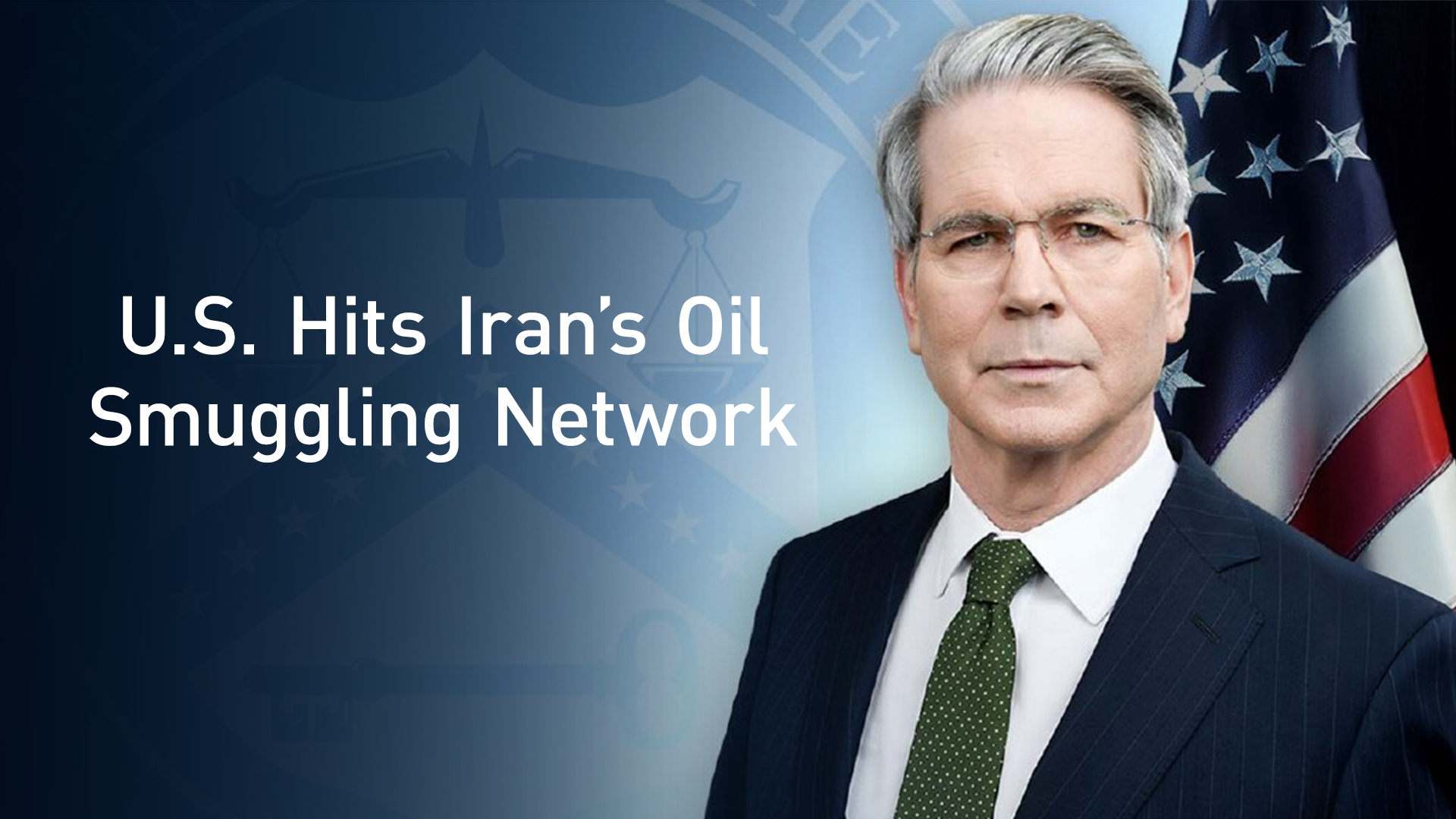'President Trump Has Been Clear: Iran Must Stop Sponsoring Terror,' Says U.S. Treasury Secretary
U.S. Treasury Secretary Scott Bessent announced new sanctions on a network smuggling Iranian oil disguised as Iraqi crude, a scheme generating $300M annually for Tehran. He vowed to degrade Iran's "growing influence in Iraq" as part of a maximum pressure campaign.

ERBIL (Kurdistan24) – The United States has intensified its "maximum pressure" campaign against Iran, announcing a new wave of sanctions targeting a sophisticated oil smuggling network that Washington says generates over $300 million annually for Tehran by disguising Iranian oil as Iraqi crude. In a direct and forceful video message, U.S. Treasury Secretary Scott Bessent declared that the action is a direct response to Iran's state sponsorship of terrorism, its proxy wars, and its pursuit of nuclear weapons, with a specific focus on countering Tehran's "growing influence in Iraq."
"President Trump has been clear. Iran must stop sponsoring terror, halt its bloody proxy wars and cease its pursuit of nuclear weapons," Bessent stated in the video message released on the social media platform X on Tuesday. "That is why Treasury is taking further action to degrade the Ayatollah and his regime's ability to finance terrorism around the world, including its growing influence in Iraq."
The Treasury Secretary detailed the nature of the targeted operation, explaining that his department is "sanctioning a rogue businessman and his network of companies and vessels that smuggle Iranian oil disguised as Iraqi oil to avoid U.S. sanctions."
This illicit trade, Bessent warned, not only funnels hundreds of millions of dollars to Tehran but also compromises the integrity of the global energy market.
"Smuggling of this nature allows Iranian oil to be sold to U.S. allies and possibly to the United States itself in violation of U.S. sanctions," he said.
He reiterated the administration's unwavering commitment to using economic tools to achieve its strategic goals. "The United States will apply economic pressure to the maximum extent possible to disrupt Iran's access to the financial resources that fuel its destabilizing activities," he affirmed.
The newly sanctioned network, according to a detailed announcement from the Treasury’s Office of Foreign Assets Control (OFAC), is operated by Iraqi-Kittitian businessman Waleed Khaled Hameed al-Samarra’i. The scheme allegedly relied on covertly blending Iranian and Iraqi oil before marketing it internationally as originating solely from Iraq.
"Iraq cannot become a safe haven for terrorists, which is why the United States is working to counter Iran’s influence in the country," Bessent declared in an accompanying statement. "By targeting Iran’s oil revenue stream, Treasury will further degrade the regime’s ability to carry out attacks against the United States and its allies."
According to the Treasury Department, al-Samarra’i ran his operation primarily from the United Arab Emirates through two key companies: Babylon Navigation DMCC, which handled logistics and shipping, and Galaxy Oil FZ LLC, which served as the main global trader. This network managed a fleet of at least nine Liberia-flagged vessels—the ADENA, LILIANA, CAMILLA, DELFINA, BIANCA, ROBERTA, ALEXANDRA, BELLAGIO, and PAOLA.
These ships reportedly engaged in clandestine ship-to-ship transfers of crude oil at sea in the Arabian Gulf and within Iraqi ports. To obscure the oil's Iranian origin, the vessels allegedly employed deceptive tactics such as spoofing their Automated Identification System (AIS) signals, conducting transfers under the cover of darkness, and creating gaps in their reporting. A web of shell companies registered in the Marshall Islands was also used to further conceal ownership.
The sanctions, issued under an executive order targeting Iran’s petroleum sectors, effectively block all property and interests of the designated individuals and entities within U.S. jurisdiction. Furthermore, the Treasury warned that foreign financial institutions facilitating significant transactions for the blacklisted network could face secondary sanctions.
The U.S. Department of State reinforced this message, with Principal Deputy Spokesperson Thomas "Tommy" Pigott stating that Washington was acting decisively "to stem the flow of revenues to the Iranian regime for its destructive and destabilizing conduct in Iraq, the Middle East, and around the world."
This action is the latest move in a broader and intensifying economic campaign against Iran that has had significant collateral effects on Iraq. As previously reported by Kurdistan24, this is the second major oil smuggling network to be sanctioned in recent months, following a similar action on July 3, 2025, against a network led by Salim Ahmed Said, which also blended Iranian and Iraqi oil.
The pressure extends beyond oil smuggling into Iraq's energy and financial sectors.
In August, a long-negotiated gas deal between Iraq and Turkmenistan, designed to alleviate Iraq's chronic electricity shortages by piping gas through Iran, collapsed after the U.S. refused to approve the arrangement over fears it would benefit Tehran. The sanctions have also hit Iraq's banking system hard, with the ECO Iraq Observatory reporting in August that 35 of the country's 72 banks had come under U.S. sanctions for various violations.
In his video message, Secretary Bessent framed these actions as part of a successful and ongoing strategy. "Since President Trump retook office, we have implemented a maximum pressure campaign," he said. "In just seven months, we have seen a significant decline in oil carried by the shadow fleet vessels we have sanctioned, reduced Tehran's profit margin, and made it increasingly difficult for the regime to export oil."
He concluded with a resolute promise: "The United States remains committed to an oil supply free from Iran's destabilizing influence. We will continue to take action against those who help fund its global campaign of terror." The latest sanctions underscore this commitment, placing Iraq squarely at the center of the economic battleground between Washington and Tehran.
By targeting Iran’s oil revenue stream, Treasury will further degrade the regime’s ability to carry out attacks against the United States and its allies. We remain committed to an oil supply free from Iran and will continue our efforts to disrupt the ongoing attempts by Tehran to… pic.twitter.com/Es0V7EpL3x
— Treasury Secretary Scott Bessent (@SecScottBessent) September 2, 2025
